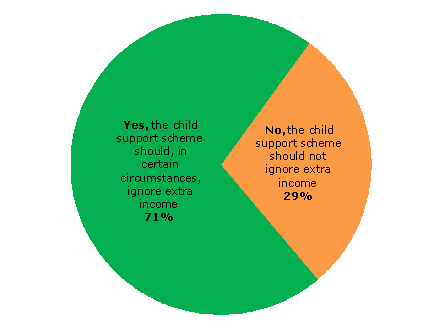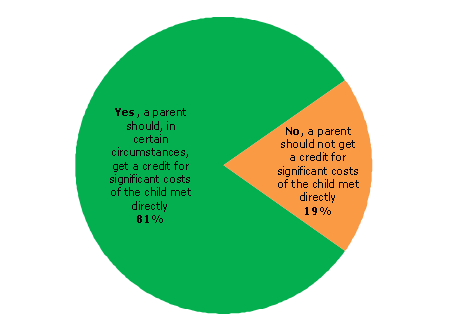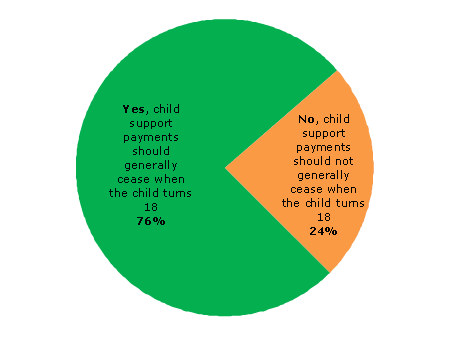Chapter 7 - Other issues
A number of other issues were considered by the Government as part of its review of the current child support rules. These included:
- whether the ability to claim child support should be restricted to either a parent of a child, someone who has legal custody of a child, or someone who is entitled to receive a Government benefit in respect of a child;
- whether parents who earn additional income after separation in order to meet set-up costs (such as a new home or furniture) should be able to apply to have this additional income exempted from their overall income for the purposes of the child support formula;
- whether paying parents who meet certain costs of the child directly (for example, for school fees, school uniforms, medical/dental services for the child) should, in some circumstances, be able to get a “credit” for this against their child support payments; and
- whether child support payments should stop when the child turns 18, unless the child is still in full-time secondary education, in which case the payments would stop when the child left school.
Results of online consultation
Q1: Do you think that the ability to claim child support should be restricted to either:
- a parent; or
- someone who has legal custody of a child; or
- someone who is entitled to receive a Government benefit in respect of a child.

Q2: Do you think that the child support scheme should, in certain circumstances, ignore certain extra income (for example, from overtime or a second job) for a finite period to allow a parent to set up a new home following a relationship break-up?

Q3: In certain circumstances, do you think that a parent should be able to obtain a credit against their child support liability by meeting significant costs of the child directly (for example, medical bills)?

Q4: Do you think the age that child support payments cease should generally be when the child turns 18 (unless they are still in secondary education)?

Summary of comments on other issues
Who should be able to claim child support?
Results were divided over whether the ability to claim child support should be restricted. Of those that made submissions on this, a recurring theme was that unduly restricting child support to certain groups could have significant adverse implications for those situations when children were being looked after by extended family members.
More generally, some felt that anyone who can prove that they are caring for the child and have the child’s best interests at heart should be able to make a claim for child support. On the other hand, some submitters felt strongly that when children leave home without their parents’ consent, then the person looking after them should not be able to make a claim for child support.
Recognising re-establishment costs
There was general support for recognising re-establishment costs, with many submitters feeling that, if allowed for a finite period of time, this would allow parents to adequately set up a stable home to allow them to look after their children. Others, however, stressed that all income should be recognised and that allowing re-establishment costs could complicate matters, would require detailed guidance, and could potentially be open to abuse.
Prescribed payments
Although this idea was very well supported, and was raised in many comments (often in conjunction with the issue of accountability for child support payments), the associated practical issues were also well canvassed – for example, that ideally there should be agreement between parents of what represented acceptable expenditure for such purposes.
Age at which child support should cease
Although most submitters were supportive, a number of comments were also received that suggest that payments should continue for longer if the child continues in tertiary education. A small number of submitters, on the other hand, thought that child support should cease at an age before 18.
Other issues
Other issues were submitted as part of the consultation but fell outside the scope of the online questions and the discussion document. They are, however, relevant when considering family relationships and interaction with the child support scheme more generally and include:
- That parents’ child support contributions should be paid into a trust account for the children, and that all subsequent expenses could then be withdrawn from that account.
- Concerns were raised about the ability of paying parents, in certain circumstances, to have contact with their children. When this issue was raised, it was often noted that this lack of contact could act as a disincentive to make payment.
- Ways of better recognising the interests of the child. This was sometimes raised in conjunction with a view that there is a need for a more holistic approach to reform relating to the care of children.
- The practical difficulties faced by many victims of domestic violence when interacting with other parents or when dealing with Inland Revenue.
Comments on other issues
Who should be able to claim child support?
“… someone who can prove that they are caring and providing for a child because it is in the child’s best interests regarding health and safety to do so.”
“Those who meet the criteria for caring for a child legally and are accountable and meet the terms of caregiving and any guardianship or parenting orders.”
“Someone who has entered into a voluntary agreement to care for a child where the agreement indicated that child support would be the way to make payments. Parents who object to their child being cared for by a person chosen by the child, without the parent's consent should not be required to pay child support simply because the child ‘ran away’ from home. This should be considered a care and protection issue and CYFS or [the] Family Court should be involved and determine obligations.”
“Also grandparents, step families.”
“The concept of access to child support is always going to be a contentious issue. Each case will need to be reviewed against a set of guidelines. However once any guidelines are published, there is always a risk that custodial parents will attempt to arrange their affairs to maximise any benefits.”
“I feel the Child Support Act needs to recognise ‘Whangai’ situations. Although this is a Māori term for an adoption that has not been processed by the proper legal authorities, it is common amongst most cultures. If the child has been given to another person at birth to raise, I feel that the biological parent should not be made liable, or be able to object and provide supporting evidence that for all intents and purposes, the caregiver is in fact the parent.”
“Someone who is actually taking care of the child; it should be the paying parent and custodian's liability to make sure the child is in good care, and to inform police or CYFS as soon as they think the child is being mistreated, and [take] action on it.”
“I think that if a child has left home without parental consent and that parent has filed a complaint with the police then no claim can be made for that child. So, if the child continues to disobey their parents there is no financial incentive for other adults to support that child against the parent's wishes.”
“There are situations where extended families are brought in to take care of the children such as [a] grandparent because neither parent is able to take care of the child. In these circumstances they should be allowed to receive child support payments to meet their costs.”
Recognising re-establishment costs
“When my ex partner did overtime for extra income it seemed that really I got the extra not him. That's why we have moved to a private arrangement, if he has income fluctuations it doesn't matter. In the same token if he was to lose his job or take a massive pay cut we would obviously need to change the arrangement.”
“Only in circumstances where [the] parent [is] accepting their responsibilities already.”
“Sometimes the extra income is intended specifically for that purpose – [to] help get on their feet following a break-up. Why take more from the paying parent when they are working hard to earn more – leave it at main income.”
“Only for a capped period.”
“If the assessment is fair to begin with this should not be necessary. But some families and non-custodial parents cannot get ahead because they are either trying to re-start … or pay for two families as in our case.”
“As long as this can be viewed as beneficial to the child, ie if there is shared care and they need to buy furniture for the child to use when visiting. If they have no shared agreement then no.”
“Absolutely. Parents who have put their careers on hold to care of their children should not be disadvantaged when a relationship breaks up. A relationship break up for many parents and their children means a huge change in circumstances. If an individual is willing to work to help their children/family re-establish they should be applauded not penalised.”
“For a restricted period, eg 3 months, as often the receiving parent has costs also in setting up a home as well as providing for children.”
“Must be criteria or guidelines around this.”
“It would overcomplicate matters, and would probably disadvantage less-educated parents who would be less likely to make special applications to exempt their ‘extra income’. It would also be likely to result in fraudulent claims.”
“Income is income. It should be a percentage of all income.”
“Overtime is income and is taxed as such. There is no tax relief for someone needing to set up a new home. Why should the children subsidise it. If the levels of child support are too high, they should be dropped, particularly where the other parent is on a benefit. In those situations it is next to impossible for a liable parent to feel they are contributing to the welfare of the children and, in middle income earning situations, it is difficult to contribute further.”
“The overtime option would make it too easy for the employers to help the liable parents to ‘fiddle’ the figures. I do think redundancy pay outs should not be included though.”
“Surely both parents are trying to re-establish at this time? The children still need day to day expenses covered, and I'm sure they have re-establishment costs too!”
“It depends on circumstances. Again, the child should not be penalised for a parent leaving.”
“There is currently admin review if there are circumstances out of the norm. Everyone is entitled to half their matrimonial settlement so this would be allowed for in that.”
“This is what the separation agreement is for. Separation agreements and the breakdown of marital property is nothing to do with care of the children.”
Prescribed payments
“Absolutely. Isn't that what child support is for? To pay toward costs of raising a child – which includes medical and schooling.”
“This way paying parents who also contribute directly can have that contribution recognised.”
“It would be a way of encouraging more non-custodial parents to be more involved with their child.”
“Depends on the expense. These costs should be shared by both parents on top of the child support liability. These should include one-off costs like new school uniforms and medical or dentistry bills. These are necessary expenses for the child’s benefit. I do not think it should include new computers or luxury items, or sports costs that can get out of hand when one parent thinks is important and the other cannot control.”
“Only if the costs are warranted.”
“It [is] all about the child, and if a person is contributing directly to the child's care and living, then that person should have a credit for it.”
“These purchases need to be agreed by both parties otherwise the paying parent determines what the money is spent on rather than leaving the care-giving parent with discretion to get what is actually needed.”
“I do not think this could be administered properly and fairly. I can see a system like this open to abuse.”
“This would be very hard to monitor, if paying parents were allowed to get a credit, there would have to be strict criteria.”
Age at which child support should cease
“I agree that child support should cease when the child turns 18 unless the child is in secondary education, child support is required to be paid. But after this period, the child either starts to work or is eligible for student loans or government benefits. If the child leaves school before 18 to start employment or tertiary education then child support should also cease.”
“Should be capped at 18 or younger if they leave school and support themselves in employment.”
“As long as they are at secondary school that’s only fair, once working or on some benefit child support should stop.”
“My son no longer receives child support as he is 18 and working fulltime, however next year he is studying fulltime and I believe that both parents’ incomes come into account in regards of him receiving a student allowance. Unless his father is paying child support then his income should not be counted for anything. If it is counted then the child support needs to continue until it no longer is.”
“Nowadays society expects parents to support their children past secondary school (aka tertiary education), and as such I feel that if a child is undertaking additional education past high school then child support should continue until 21.”
“Up to 25 if still in education. This is when student allowance kicks in without parental income assessment.”
“I think that given that tertiary students are not considered independent till they are 25 for allowance purposes, then child support should be paid to tertiary students until they reach this age.”
Use of trust accounts
“As the system is right now the money is paid in to the CP account and [there] is no control over how the money is spent. Also [it] is not clear how much the CP contribution to the child support is and what are the real expenses with the child. Instead if both parents’ contribution is paid into a trust account for the children’s benefit all the expenses can be withdrawn from that account. This way the children can benefit more and any money not spent will accumulate for them.”
“The Government should look at setting up trust accounts for children “receiving” child support to ensure it is actually used on the child for school fees etc and not by the parent for luxury items such as cigarettes and alcohol. Receipts can be submitted to the trust for reimbursement at month's end (like any tax return). Anything not spent can stay in the account for future use. When the child turns 18 they should be able to get that money directly to help them out in life.”


